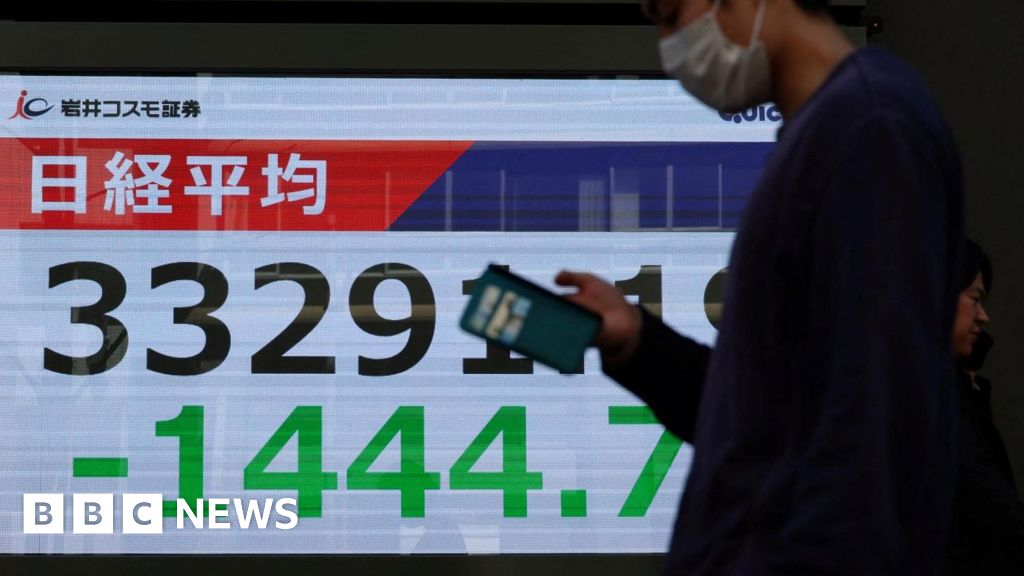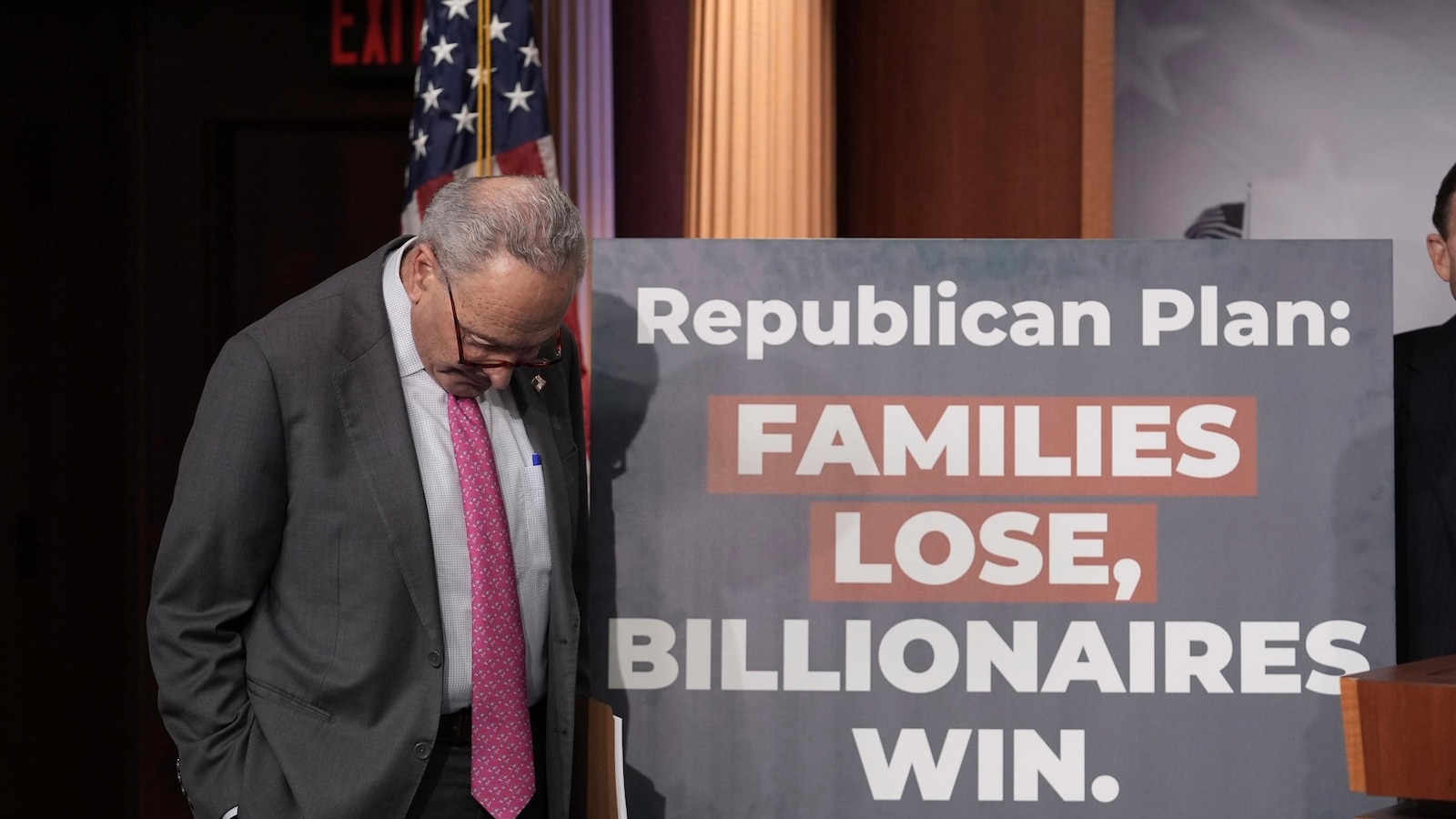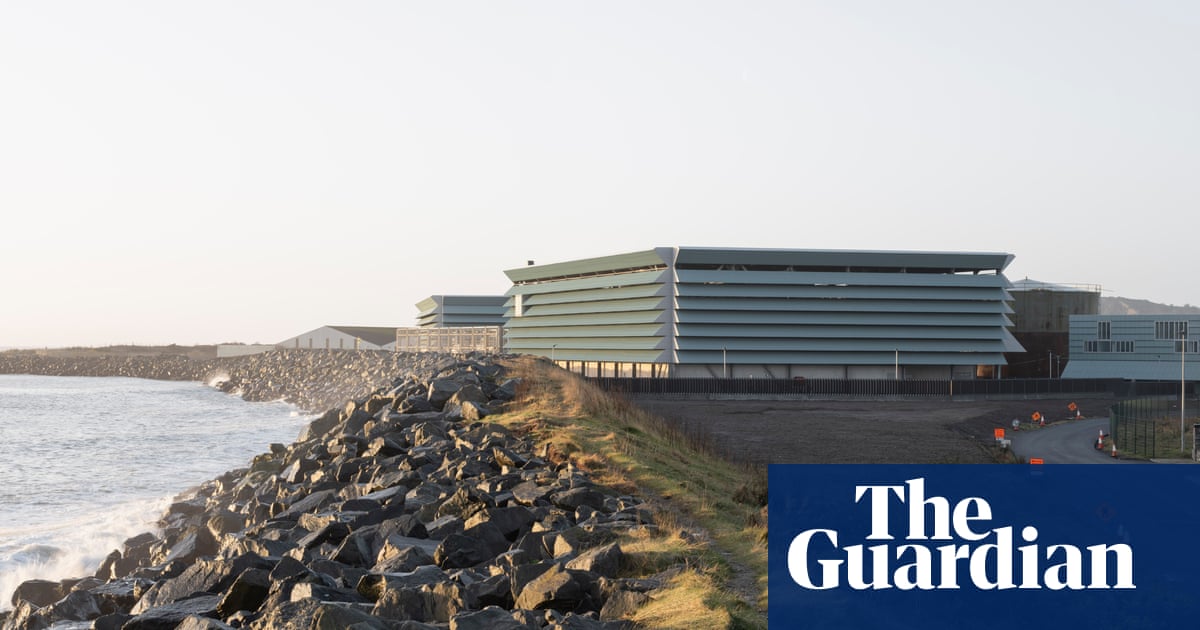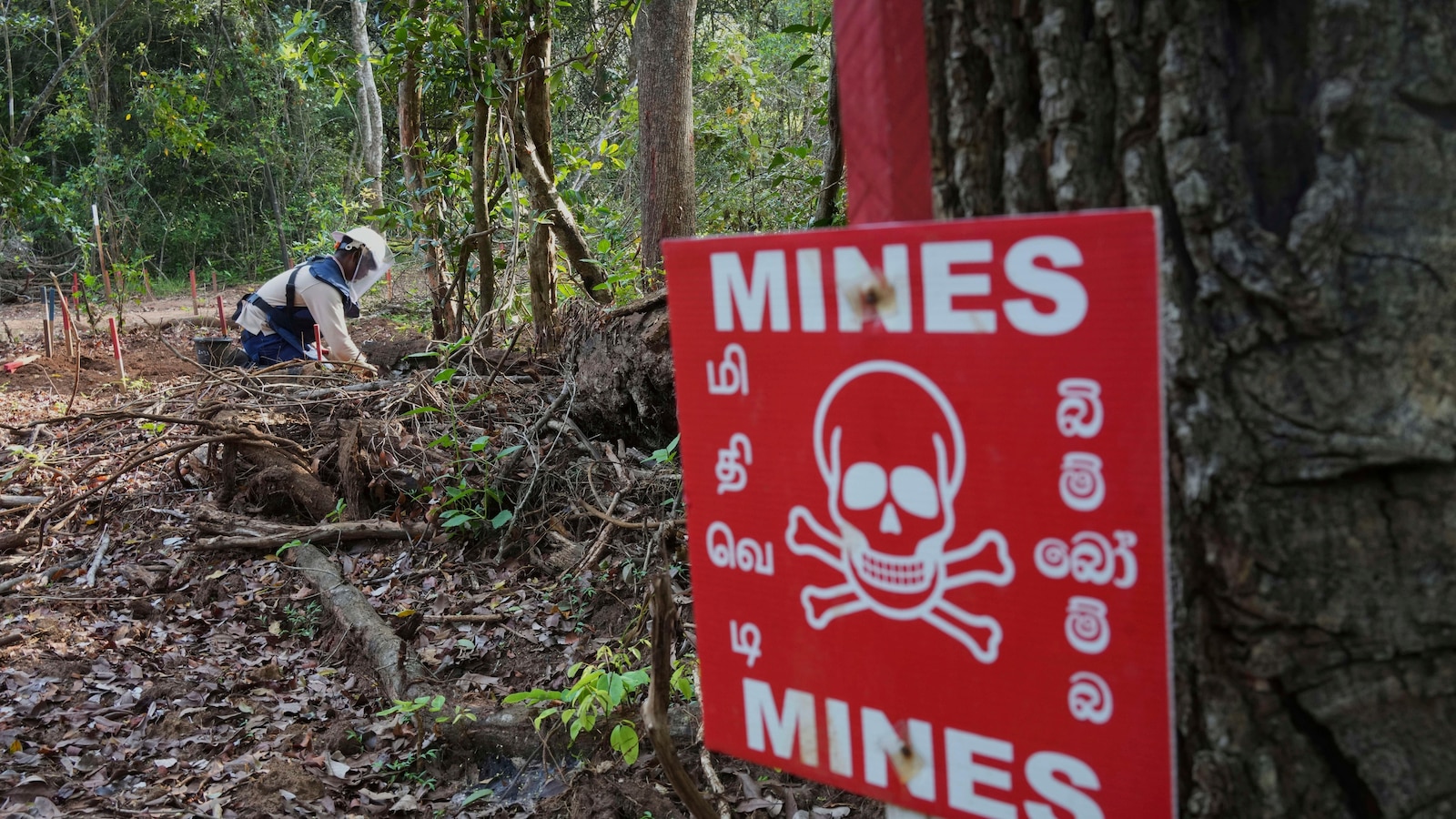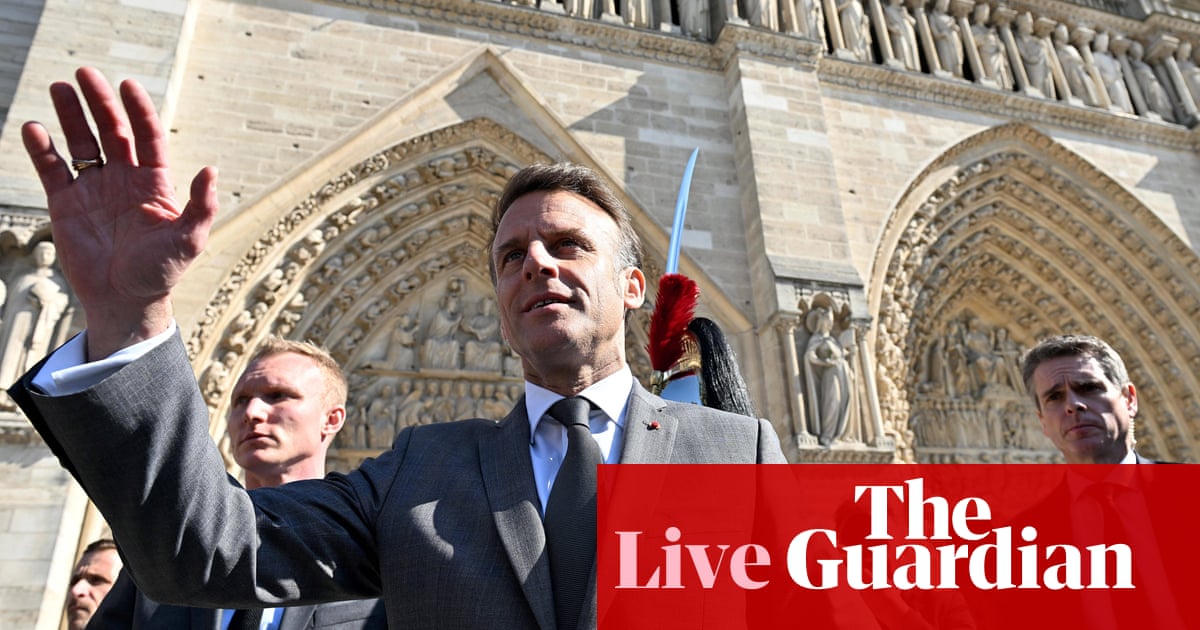
Macron calls Trump’s US tariffs ‘brutal and unfounded’ – Europe live
Trump’s tariffs ‘brutal and unfounded,’ French president Macron says
French president Emmanuel Macron is now addressing a meeting of business leaders talking about how to best protect the French economy following Donald Trump’s tariffs.
He opens by saying the US president’s decision was “brutal and unfounded,” as he expresses concern about the tariffs’ “massive” impact on France and its overseas territories and Europe more broadly.
He signals there will need to be an answer to this move.
Key events
-
Trump’s tariffs ‘brutal and unfounded,’ French president Macron says
-
EU blasts Trump’s tariffs as ‘deplorable’ for hitting some of world’s poorest countries
-
France’s Macron to meet with industries affected by US tariffs this afternoon
-
US tariffs need to be negotiated down, Swedish PM says, as he calls for ‘European renaissance’ on the back of Trump’s actions
-
Spain’s Sánchez accuses Trump of causing ‘unfair, unjustified crisis’ as he defends European values
-
Ireland’s Martin warns against tariffs ‘undermining’ US pharma companies; says he opposes digital services tax
-
Irish PM and EU justice commissioner criticise Netanyahu’s visit to Hungary
-
‘Old order is gone, but new has not yet been determined,’ Martin says, as he expects further talks on tariffs
-
€380bn of EU exports subject to new tariffs, accounting for 70% of bloc’s exports to US, commissioner says
-
‘No justification’ for US tariffs, Irish prime minister Martin says
-
Pharmaceuticals could be next to face tariffs, EU officials fear
-
Trump’s tariffs could undermine Brexit deal on Northern Ireland – analysis
-
New US tariffs to cost Poland 0.4% GDP, or €2.4bn, prime minister says
-
Spain blasts ‘protectionist’ Trump tariffs as he announces a Covid-style support package
-
Orbán confirms plans to withdraw from ‘political’ International Criminal Court, praised as ‘bold’ by Netanyahu
-
EU trade commissioner says he will speak to US partners on Friday, EU ‘won’t stand idly’
-
Spain puts forward €14.1bn package to support economy in face of Trump’s tariffs
-
US ‘as active as it has ever been’ in Nato, Rubio says, as he seeks to reassure Europeans
-
US state secretary Rubio appears in Brussels at Nato meeting
-
Italy’s Meloni cancels plans in order to focus on responding to Trump’s tariffs
-
Israeli PM Netanyahu visits Orbán’s Hungary despite ICC arrest warrant
-
Spain’s far-right Vox party blames EU for Trump’s tariffs
-
Spanish wine-makers say tariffs are ‘significant blow’ to wineries, will hit US consumers
-
Germany condemns Trump’s decision, warns about impact on global trade
-
US tariffs economic ‘catastrophe’ and challenge for EU, French prime minister says
-
EU to respond in ‘proportionate and decisive way,’ but use of anti-coercion rules only ‘last resort,’ leading lawmaker says
-
EU’s options on responding to Trump’s tariffs
-
German business group denounces ‘unprecedented attack’ on global trade
-
Danish prime minister visits Greenland
-
European stock markets sliding in response to Trump’s tariffs
-
Norway concerned about ‘very serious’ tariffs, hopes to hold further talks with US, prime minister says
-
UK prime minister highlights need for ‘cool and calm heads’ after Trump’s tariffs
-
European reactions to Trump’s tariffs – round up
-
Morning opening: A broken stick
EU blasts Trump’s tariffs as ‘deplorable’ for hitting some of world’s poorest countries
Lisa O’Carroll
EU officials have denounced the indiscriminate nature of tariffs Donald Trump has imposed on some of the world’s poorest countries as a “deplorable move”.
“To see countries like Lesotho, Cambodia, Bangladesh hit the hardest by US tariffs is absolutely deplorable and is something that is extremely difficult for us to comprehend,” said one.
“These are not countries that are producing semiconductors, these are not countries that are producing cars. They produce things that the US may not produce coffee, bananas or other things. So these do not represent a threat,” they said.
The EU’s says if negotiations fail and it imposes counter tariffs, they will be targeted in a “smart way”.
The officials have also confirmed it would not ever contemplate messing with food standards to address Trump’s complaint last night over “non tariff barriers”, seen as a reference to rules banning US hormone fed beef and chlorinated chicken in the EU.
“We do not lower our standards. So whenever we protect consumers, protect the environment, we have legitimate legislation that is non discriminatory, which is the basic test in trade law. We do not discriminate against anyone. We design our rules in line with the rules of the World Trade Organization. We do not lower the level of protection of food, for example, in any negotiation, certainly not in this negotiation,” said a senior insider.
The EU is refusing to comment on the details of its retaliatory response saying it has to analyse the impact first but that everything “remains on the table” including measures that could see US tech companies unable to charge for their intellectual property for software.
The bloc is facing three types of tariffs – tariffs on aluminium and steel Trump announced last month, last night’s 25% tariff and cars and the 20% blanket tariff on exports.
It has now concluded its response on aluminium and steel which will be put to a vote next Wednesday with analysis of the other two tariffs expected to take weeks.
France’s Macron to meet with industries affected by US tariffs this afternoon
Over in France, president Emmanuel Macron will soon be meeting with representatives of sectors hit by US tariffs.
According to media reports, the meeting – expected to start 4pm local time – will bring together business leaders from aerospace industry, agriculture, wine, chemicals, electronic and metallurgy, among others.
French prime minister François Bayrou will also be there, with numerous ministers.

Miranda Bryant
The Danish prime minister, Mette Frederiksen, has put on a show of unity with Greenlandic leaders in her first visit to the Arctic island since Donald Trump’s renewed threats to acquire the territory, saying that when Greenland is in a “difficult situation” so too are Denmark and Europe.
The Danish PM boarded an inspection ship on Thursday with Greenland’s new prime minister, Jens-Frederik Nielsen, after which they were due to hold a joint press conference expected to focus on unity and Arctic security.
Greenland’s outgoing prime minister, Múte B Egede, was also onboard. The three leaders were pictured looking out to sea and perched on a helicopter while onboard the ocean-patrol vessel HDMS Vædderen.
In contrast to last week’s visit by the US vice-president, JD Vance – which, after a diplomatic outcry, was limited to the US military base Pituffik and did not involve Greenlandic or Danish representatives – Frederiksen was greeted at the airport by Egede and went straight to the capital, Nuuk, where she met Nielsen.
On social media she posted a picture of herself alongside the incoming and outgoing leaders, with the message: “Cooperation. Equality. Security.”

Jakub Krupa
Earlier today I flagged the Danish prime minister Mette Frederiksen’s much anticipated visit to Greenland (9:44), so let’s get an update on that from our Nordic correspondent, Miranda Bryant.
US tariffs need to be negotiated down, Swedish PM says, as he calls for ‘European renaissance’ on the back of Trump’s actions
Sweden sees the US announcement of tariffs as the start of negotiations, in which the Nordic country aims to ultimately get as low tariffs as possible, prime minister Ulf Kristersson said.
In a wide-ranging speech responding to the move, he said:
“We are ready to retaliate. Our preferred option is of course to negotiate a deal. We don’t want growing trade barriers. We don’t want a trade war.
If this fails, the EU stands ready with countermeasures. And we are big trading power globally.
But our goal is not retaliation, but to lower tariffs and increase trade – with the US and with other countries. That is what made our populations more prosperous and the world safer.”
Pivoting to broader policy challenges, he stressed that “the rules-based order that we have operated within since the second world war is now on shaky ground.”
He set his three priorities – increasing immediate support for Ukraine, boosting military and defence, and increasing competitiveness – rejecting dismissive comments about Europe’s future.
“Europe is certainly not perfect, but we do have agency over our own future,” he said.
He added:
“If EU manages to reform while others either are banned from global trade or isolate themselves from global trade – then Europe will be a winner.
The world needs and deserves a European renaissance. Sweden will do our part of it.”
Spain’s Sánchez accuses Trump of causing ‘unfair, unjustified crisis’ as he defends European values
Sam Jones
Let’s bring you some more comments from Spanish prime minister Pedro Sánchez’s speech earlier.
He said Spain would move past “this unfair and unjustified crisis into which some people have decided to plunge the world” and would not allow itself to be “dragged into zero-sum-game thinking or into a way of seeing the world that is guided by fear, disinformation and short-termism”.
In a final rebuke to Trump, he added:
“We will continue to push for a just distribution of wealth, for environmental sustainability and for equality between men and women.
We will keep working for European integration, we will keep defending multilateralism, we will keep opening ourselves to the world, and we will keep looking for partners who respect our interests and who also share our values.”
Ireland’s Martin warns against tariffs ‘undermining’ US pharma companies; says he opposes digital services tax
Micheál Martin gets asked specifically about the potential problems for the country’s pharmaceutical industry (13.50).
He says his government needs to “maintain engagement” with US officials to “convey the complexity of the pharmaceutical story,” as he points out that Ireland operates “as part of a complex supply chain” with “physical infrastructure” that is “not easily relocatable overnight.”
He warns there is “a real danger of undermining your own companies, the US companies, by proceeding precipitously or in a premature way.”
He also is asked about proposals to introduce a European digital services tax.
“We do not favour a digital services tax,” he says, adding that the EU’s response needs to be “considered … measured,” and “one that is clearly calculated and calibrated not to bring more damage upon the European economy and European citizens.”
“The desired outcome is negotiations between the US and the European Union,” he says.
And that concludes their press conference.
Elaborating on the EU’s planned response to US tariffs, EU commissioner McGrath expands a bit by saying the focus is on “on preventing the harm rather than responding to the harm.”
“We’re still in a scenario where we’re looking at potential [harm], and while sentiment is immediate and uncertainty has immediate impacts, the direct impact of tariffs is something that will take some time to work its way through the system,” he says.
He also pushes back against Sánchez’s suggestion to create an EU aid fund for companies affected, saying it is “premature.”
“When you talk about an EU fund, there aren’t many potential sources of funding. Is it additional member state contributions? Is it new own resources? Is it collective borrowing? Is it reallocation of resources from one part of the budget to another? So we’re not in that space, because our focus is on negotiations,” he says.
Irish PM and EU justice commissioner criticise Netanyahu’s visit to Hungary
Martin and McGrath also get asked about Netanyahu’s visit to Hungary earlier.
The Irish prime minister Martin says he is “concerned about trends within Hungary”, as he says “there are procedures there in term of dealing with member states who we believe have either transgressed the rule of law or are not really behaving in the full spirit of EU unity”.
“We’ve fully supported the ICC. We’ve provided significant funding, additional funding above any per capita contribution to the ICC. International rule of law is extremely important, and Ireland will continue to adhere to it,” he says.
Commissioner McGrath speaks in a similar vein, adding that “the concerns that we have in the Commission about rule of law related issues [in Hungary] are well documented.
“Unfortunately, this is another retrograde step from the Hungarian authorities. Let’s see what happens over the period ahead,” he says.




